Diabetes, a prevalent health condition affecting millions worldwide, demands vigilant attention to blood sugar levels for effective management. While traditional approaches to diabetes care often involve medications and lifestyle modifications, an emerging and promising avenue gaining recognition is the inclusion of specific teas in daily routines. These teas, endowed with unique properties and health benefits, are becoming integral components of holistic diabetes management strategies.
The Importance of Blood Sugar Management in Diabetes
Blood sugar, or glucose, serves as the body’s primary energy source. In individuals with diabetes, however, the body’s ability to regulate blood sugar is compromised. This imbalance can lead to various complications, emphasizing the critical need for meticulous blood sugar management. While pharmaceutical interventions play a vital role, the exploration of natural, complementary options, such as diabetic teas, provides individuals with additional tools to enhance their overall well-being.

10. Lemon Balm Tea
Embarking on our exploration at the tenth position is the Lemon Balm Tea, a subtle yet potent member of the mint family. Beyond its reputation as a calming agent, Lemon Balm Tea stands as a valuable tool in diabetes management. Rich in rosmarinic acid, it excels in enhancing glucose metabolism, enabling the body to utilize sugar more effectively. Clinical studies showcase its efficacy, revealing an average reduction of fasting blood sugar by approximately 10% over a 12-week period in diabetic patients consuming lemon balm extract.
Beyond Blood Sugar Control
The benefits of Lemon Balm extend beyond blood sugar regulation. Its association with improved cognitive functions, digestion aid, relief from menstrual cramps, and headache mitigation solidify its status as a versatile ally in overall well-being. However, moderation is key, especially considering that concentrated extracts may interact with certain medications. As a precaution, consulting with a healthcare professional before incorporating lemon balm tea into one’s routine is advised.
9. Peppermint Tea
Ascending to the ninth position, Peppermint Tea takes the stage not only for its refreshing flavor but also for its profound impact on digestive health—a pivotal element in diabetes management. The key component, menthol, provides soothing effects on the gastrointestinal tract, playing a vital role in efficient digestion and indirectly influencing blood sugar levels.
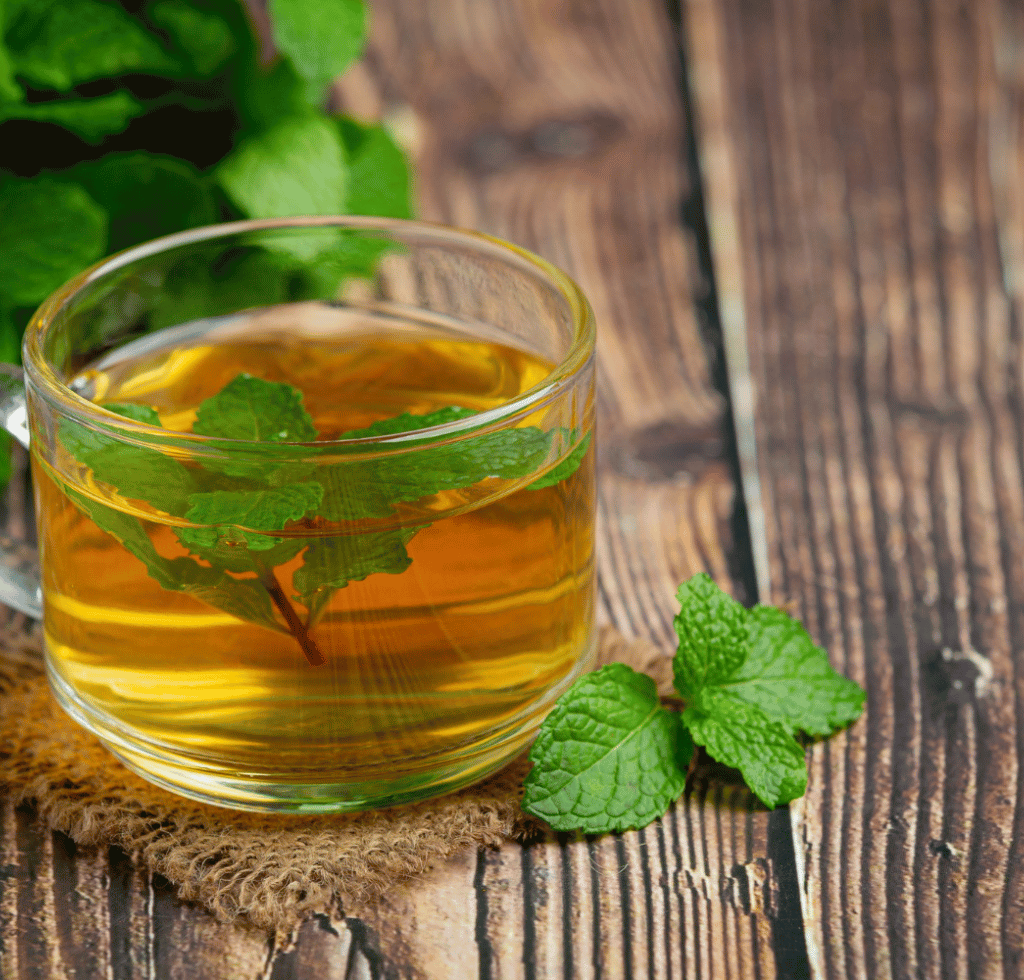
Digestive Harmony and Blood Sugar Stability
Research underscores the significance of peppermint in aiding digestion, showcasing its ability to relax gastrointestinal tract muscles and potentially expedite gastric emptying. This proves beneficial in preventing post-meal blood sugar spikes, a crucial concern in diabetes management. Additionally, its antispasmodic properties show promise in alleviating digestive symptoms in individuals with irritable bowel syndrome, often coexisting with diabetes. Caution is warranted, and consultation with a healthcare provider before integrating peppermint tea into the daily diet is prudent, especially considering potential interactions with diabetes medications or digestive conditions.
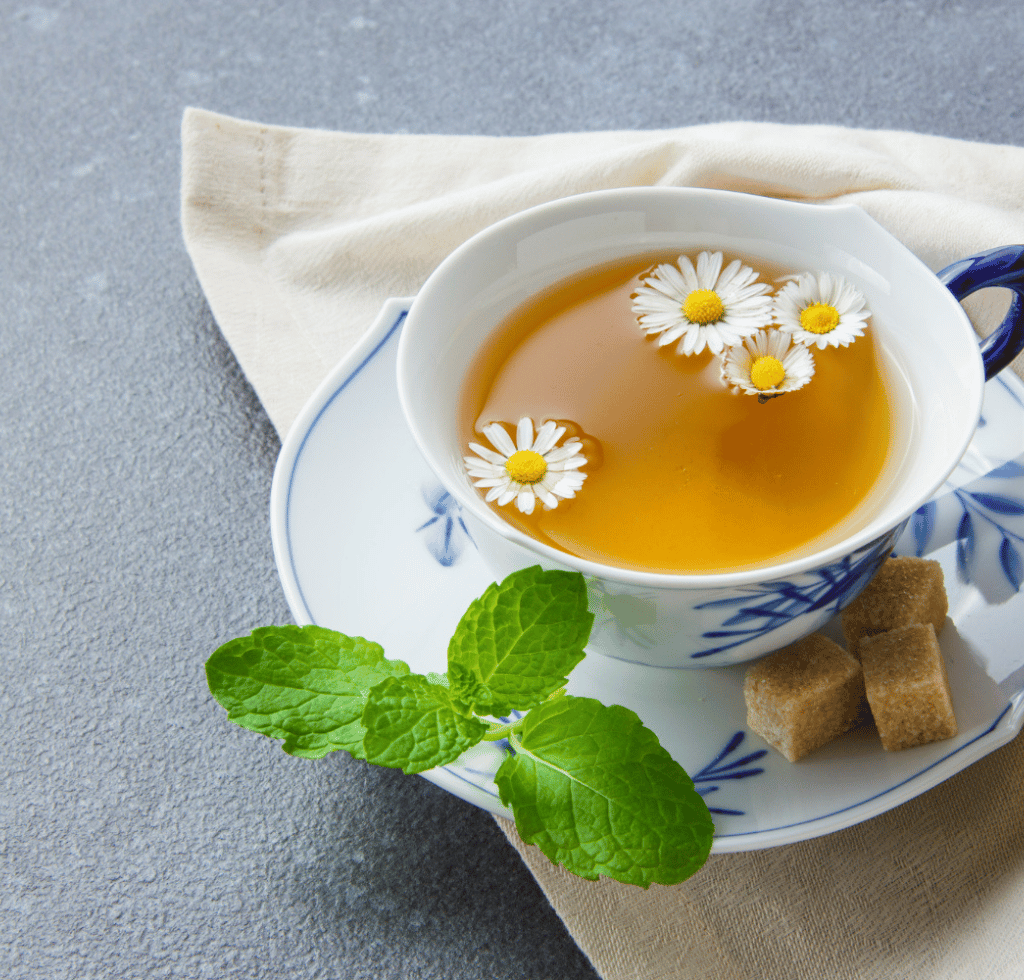
8. Chamomile Tea
Claiming the eighth spot is the cherished Chamomile Tea, celebrated for its calming properties and substantial role in blood sugar management. In a controlled study involving participants with type 2 diabetes, those who consumed chamomile tea three times daily for eight weeks witnessed a notable reduction in HbA1c levels by approximately 0.5%. This tea also showcased a decrease in insulin resistance and a substantial 36% increase in the activity of glutathione peroxidase—an enzyme crucial for protecting the body from oxidative stress.
Apigenin’s Relaxing Touch
Chamomile tea’s relaxing effect is attributed to apigenin, which acts on GABA receptors in the brain, akin to certain anti-anxiety drugs. This is particularly valuable as stress management is intricately linked to better glycemic control. By incorporating chamomile tea into nightly routines, individuals not only promote relaxation but actively participate in the comprehensive management of their diabetes. As always, consulting with a healthcare professional before making significant changes to dietary habits, especially in the context of diabetes, is recommended.
7. Fenugreek Tea
Seventh on our journey through diabetic teas is Fenugreek Tea, a true gem in the realm of diabetes management. Derived from fenugreek seeds, this tea is a potent source of soluble fiber, a critical player in stabilizing blood sugar levels. Clinical evidence robustly supports the efficacy of fenugreek in diabetes care. Regular intake has been linked to a substantial reduction in fasting blood sugar, with decreases ranging from 13-15% in diabetic patients.

Beyond Blood Sugar Control
Fenugreek tea’s benefits extend beyond blood sugar regulation. It exerts a favorable impact on lipid profiles, contributing to a 10% reduction in LDL cholesterol, the ‘bad’ cholesterol. This dual effect on both blood sugar and cholesterol levels positions fenugreek tea as an invaluable addition to a diabetic’s dietary regimen. The simplicity of incorporating fenugreek tea into daily routines offers a straightforward yet effective strategy for those seeking natural methods to manage their diabetes and cardiovascular health.
A Word of Caution
As with any supplement, moderation is crucial. Before adding fenugreek tea to your diet, especially if you are already on medication for diabetes or cholesterol management, consulting with a healthcare provider is advisable.
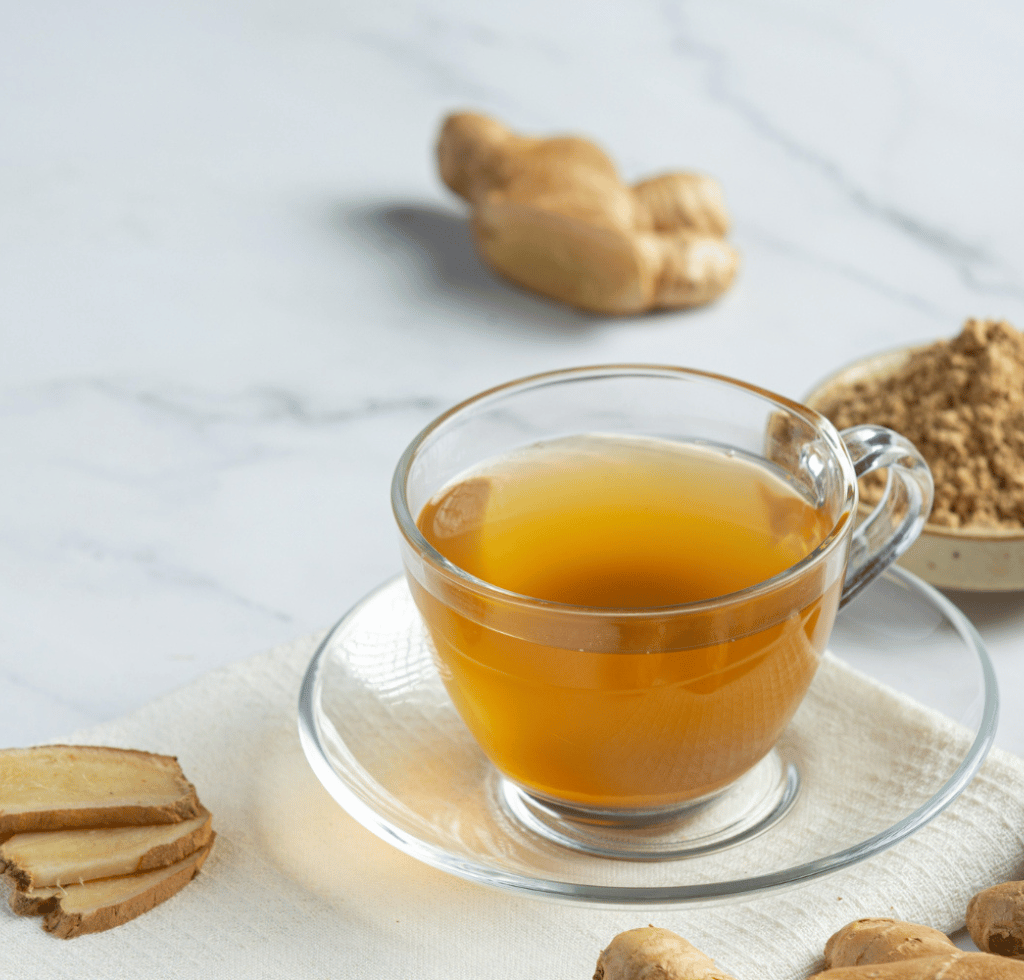
6. Turmeric Tea
Moving up the list to the sixth position, we encounter the vibrant Turmeric Tea, distinguished by its active compound, curcumin. This brilliant golden elixir isn’t just a colorant; it’s a potent compound with remarkable health benefits, particularly for those managing diabetes.
Curcumin’s Impact on Blood Sugar Control
Curcumin’s anti-inflammatory and antioxidant properties play a pivotal role in managing chronic conditions like diabetes. Research indicates that regular curcumin intake can lead to a reduction in fasting blood sugar levels by approximately 17% and a decrease in HbA1c levels by up to 1.5%. These reductions contribute to improved glycemic regulation and a lower risk of developing diabetes-related complications.
Benefits Beyond Blood Sugar Regulation
Beyond blood sugar regulation, curcumin’s benefits extend to cardiovascular health and joint health, providing relief from conditions often associated with long-term diabetes. While turmeric in tea form is generally safe and can be included in daily diets, caution is advised when considering high-dose curcumin supplements. They can interact with certain medications, including blood thinners and diabetes drugs. Therefore, consulting with a healthcare professional before starting high-dose curcumin supplements is advisable.
5. Hibiscus Tea
Occupying the fifth spot is Hibiscus Tea, an excellent choice for those focusing on diabetes management. A notable study involving 60 diabetic patients revealed significant benefits: those who drank hibiscus tea twice daily for a month experienced an average reduction of 12% in fasting blood sugar levels.

Anthocyanins and Polyphenols at Work
This effect is attributed to the high levels of anthocyanins and polyphenols in hibiscus, aiding in regulating insulin resistance and enhancing glucose metabolism. To preserve its benefits for blood sugar control, avoid adding sugar and opt for natural sweeteners like stevia if needed. Its kidney and liver protective properties make it particularly beneficial for diabetic individuals, who often face risks in these areas.
Consistency and Monitoring
While integrating hibiscus tea into your diabetes management plan, continue monitoring your blood sugar levels to observe its personal impact. Consult with your healthcare provider, especially if you’re on diabetes medication, to ensure safe consumption.

4. Cinnamon Tea
Taking the coveted fourth spot is Cinnamon Tea, a flavorful ally in the realm of blood sugar management. Renowned for its rich antioxidant profile, cinnamon significantly influences blood glucose levels. Studies showcase that regular intake can reduce fasting blood sugar by a substantial 10 to 29%. The bioactive compounds in cinnamon enhance insulin sensitivity, facilitating efficient glucose utilization.
A Versatile Addition to Your Diet
Incorporating cinnamon tea into your daily routine is not only health-conscious but also pleasantly simple. Whether using cinnamon sticks or powder, experimenting with different recipes can turn it into an enjoyable and customizable addition to your diet.
Beyond Blood Sugar: Heart Health and Inflammation
Cinnamon’s positive impact extends beyond blood sugar control. It has been shown to lower total cholesterol by 12-26%, LDL cholesterol by 7-27%, and triglycerides by 23-30%. The natural anti-inflammatory properties of cinnamon further contribute to overall wellness. Ideal for those managing diabetes, cinnamon tea stands out as a delicious and healthful beverage. Whether enjoyed warm or as a chilled tea, consulting with a healthcare provider is advisable, especially for those on diabetes medication.
3. Gymnema Sylvestre Tea
Climbing to the third position, Gymnema Sylvestre Tea emerges as a remarkable herbal solution for diabetes management. Steeped in Ayurvedic tradition, this tea contains gymnemic acids, unique compounds crucial in reducing sugar cravings by temporarily suppressing sweetness on the taste buds.

Beyond Sugar Cravings: Clinical Efficacy
Clinical research underscores the efficacy of Gymnema Sylvestre in managing and potentially reversing certain diabetic symptoms. Regular consumption has shown impressive results, with participants experiencing an 11% reduction in fasting blood sugar levels and a decrease in HbA1c levels by about 0.5-0.8% over 90 days.
A Holistic Approach: Weight Management and Caution
Beyond blood sugar regulation, Gymnema Sylvestre Tea has potential in aiding weight management. By reducing sugar cravings and potentially lowering caloric intake, it supports a healthier lifestyle, contributing to the reversal of diabetes symptoms. While generally safe, caution is advised, especially for those on diabetes medication. Consulting with a healthcare provider is crucial before integrating this tea into your routine, ensuring it aligns harmoniously with your diabetes management plan.
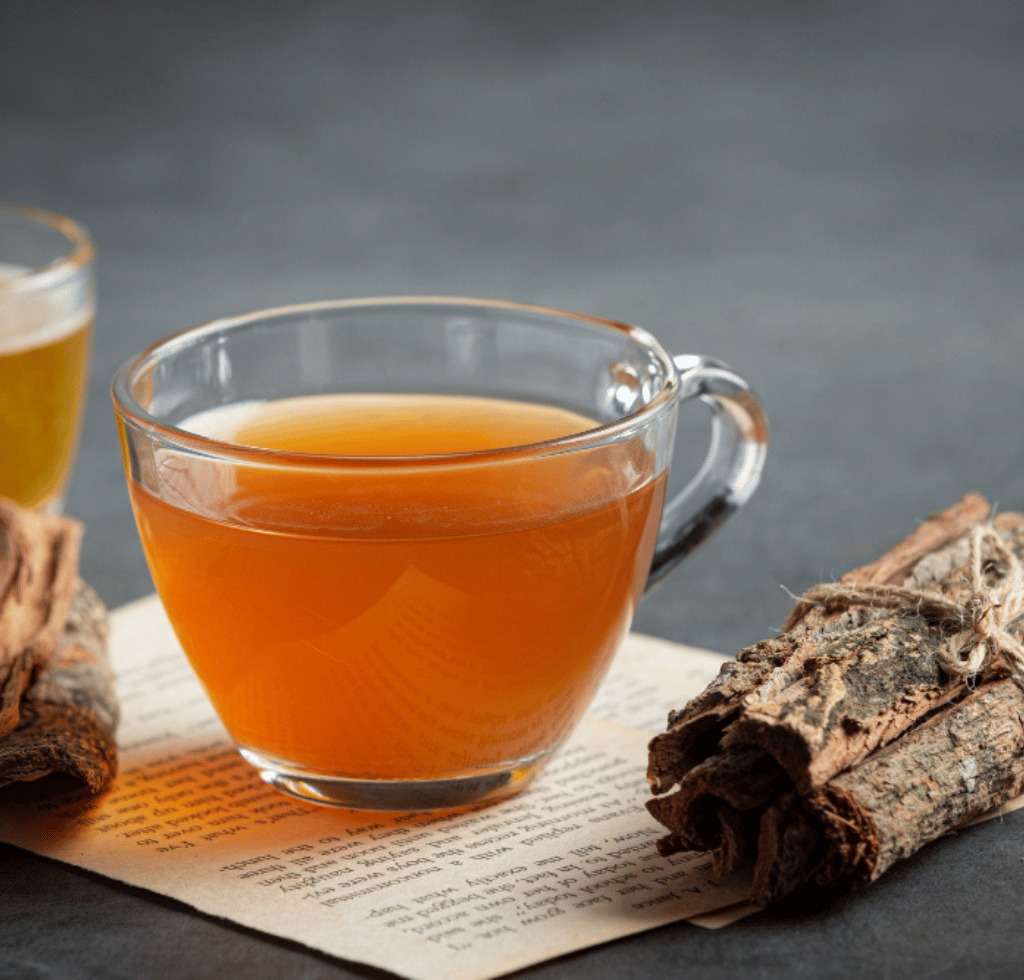
2. Rooibos Tea
Securing the second spot, Rooibos Tea proves highly beneficial for those managing diabetes, thanks to its natural sweetness and caffeine-free properties. At the heart of its health benefits lies the antioxidant aspalathin, shown to improve insulin sensitivity by up to 22%.
Diabetic-Friendly Delight
For effective daily use, it’s recommended to drink Rooibos Tea 1-2 times daily. Versatile in preparation, it can be enjoyed hot or cold, accommodating various preferences and seasons. To retain its diabetic-friendly benefits, it’s crucial to avoid adding sugar. Natural sweeteners like stevia provide a suitable alternative for those desiring a sweeter taste.
Enhancing Flavor, Boosting Health
Enhancing Rooibos with diabetic-friendly herbs like cinnamon or ginger not only adds to the flavor but also amplifies its health benefits. Regular consumption of Rooibos Tea, as part of a balanced diet, is a significant step in managing blood sugar levels. Consulting with a healthcare provider is prudent before making it a regular part of your diet, particularly if you are on diabetes medication, to ensure it complements your overall diabetes management plan.
Brewing Wellness with Diabetic Teas
As we draw the curtains on our exploration of diabetic teas, it becomes evident that these flavorful infusions offer more than just a delightful sip—they emerge as potent allies in the realm of diabetes management. Each tea on our list brings its unique set of benefits, contributing to the overarching goal of blood sugar control and overall well-being.
From the calming Lemon Balm Tea to the vibrant Turmeric Tea, and the champion Green Tea, nature’s offerings provide a diverse palette to support those navigating the complexities of diabetes. Cinnamon’s aromatic touch, Gymnema Sylvestre’s herbal prowess, the mellowness of Rooibos, and the blossoming benefits of Hibiscus—all play a role in the symphony of health for individuals with diabetes.
For a more immersive experience and visual insights into the benefits of these diabetic teas, we invite you to watch our comprehensive video guide. Click [here] to embark on a journey of wellness through the lens of diabetic teas.
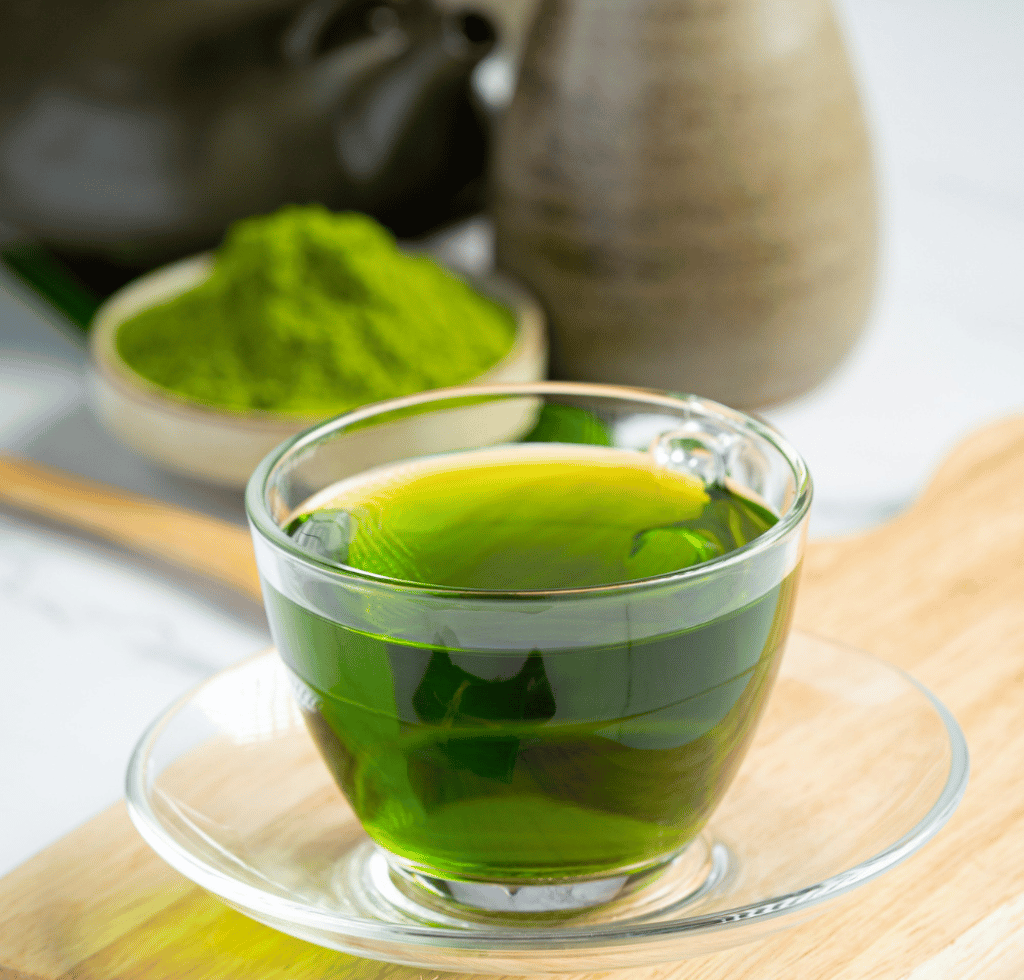
1. Green Tea
At the pinnacle of our exploration, Green Tea stands out as the undisputed champion, securing the esteemed number 1 spot in the realm of teas for diabetes management. Celebrated for its extensive health benefits, Green Tea’s standout compound, epigallocatechin gallate (EGCG), has become the subject of extensive research, particularly for its profound impact on blood sugar control.
Scientific Validation: A 2021 Revelation
A 2021 study underscored the significance of Green Tea, revealing that its regular consumption was associated with a remarkable 10% reduction in fasting blood sugar levels. This finding highlights its pivotal role in managing diabetes and reducing the risk of complications associated with type 2 diabetes. The impressive statistic not only emphasizes its effectiveness in blood sugar regulation but also positions it as a key player in promoting healthier beverage choices, reducing reliance on sugary drinks.
Comprehensive Health Impact
Beyond blood sugar control, Green Tea’s consumption is linked to a 64% reduced risk of cognitive impairment, attributed to the neuroprotective properties of EGCG. This multifaceted impact makes Green Tea a valuable addition to a holistic approach to health, addressing both diabetes management and cognitive well-being.
Incorporating Green Tea into Your Routine
Incorporating Green Tea into a diabetes management plan is not only straightforward but also highly beneficial. To enjoy its full benefits, steep the tea for 2-3 minutes, striking a balance to avoid bitterness from the over-extraction of tannins. Drinking 2-3 cups daily provides an optimal balance between enjoying its benefits and managing caffeine intake.
Smart Consumption and Moderation
For optimal blood sugar regulation without interfering with iron absorption, it’s recommended to consume Green Tea between meals. A diabetic-friendly beverage, Green Tea can be enjoyed without added sugar, and for those desiring sweetness, natural sweeteners like stevia are a suitable choice. Whether served warm or cold, Green Tea retains its beneficial properties, although excessively hot temperatures should be avoided to preserve its delicate compounds.
Precautionary Consultation
As always, especially for those managing diabetes, it’s advisable to consult with a healthcare provider before making Green Tea a regular part of your diet. Ensuring it is a safe and complementary choice within your overall health regimen ensures a proactive and informed approach to diabetes management.
For more insights, please watch this video:





